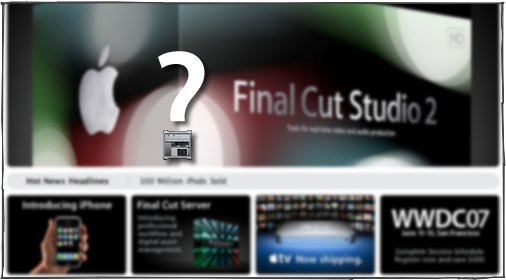


What does Apple's delay of Leopard mean for the company and Mac users? While certain analysts have been falling all over themselves to associate a serious threat of calamity and doom with a delayed Leopard, they haven't offered any basis for their outcry. Here's what is so suspicious about their claims.
Great Expectations
Back in January, my Macworld Expo 2007 wish list articles looked at expectations for new hardware and software. As the article on software pointed out, Apple had at past events “used Macworld to introduce an increasing number of new software applications, from basically nothing in 2000 to seven significant apps last year.”
Based on previous years’ events, it appeared certain that iWork and iLife would both get a new installment and that Leopard, the next version of Mac OS X, would be the “star of the show.”
But Macworld didn't turn out to be about the Mac brand much at all. Instead Apple introduced new three consumer electronics products under $500: 

Yes, the Apple TV and the iPhone are both really a Mac inside--running Mac OS X on customized hardware--but the announcements of new desktop Mac software and a new Mac OS X were not only absent at Macworld but actually went conspicuously unmentioned.
Putting the Mac in Macworld
Of course, Macworld Expo isn't Apple's Mac event; it's run and named by IDG, a media company that has little control over what Apple chooses to do or announce.
A few years ago, when IDG decided to move its summer Macworld Expo event from New York City to Boston, Apple pulled out entirely and shifted its summer announcements to its own Worldwide Developer Conference.
Apple Superstar
A show needs both a star performer and an audience. Without Apple, Macworld isn't much of a draw. IDC's mid-year Macworld Expo dried up and blew away entirely, just like the old AppleFest or NeXTWorld shows.
Like many superstar performers, Apple is a bit of a diva. After setting up a regular pattern of Mac software and hardware releases, the company yanked the rug on convention and introduced an entirely fresh, new product direction this year.
Apple not only announced a bold new leap into consumer electronics, but also formally dropped the “Computer” from its business name. There are two reasons why, but many column-analysts seemed to get both wrong.
The Dinosaur Columnists
Being wrong on occasion means you take some risks. Being wrong about half the time means you're just guessing. If you're wrong more than half the time, you are probably being disingenuous.
Recall how many times John Dvorak, Rob Enderle, and Paul Thurrott have yammered about the inconsequence of Apple and made wild predictions about its certain failure.
In reality, Apple’s Mac sales are now growing twice as fast as other major American PC makers and it earned more than half what Microsoft did in the last reported quarter. So much for market share as a factoid to hide behind while cursing Apple and its ability to sell machines!
Instead of changing their tune however, they're all just getting more desperate to find the dark cloud around Apple's shiny sliver linings.
When presented with new facts, if you don't change your opinion you aren't holding an opinion; you're holding on to a false conviction.
An interchange of reasoning supported by facts is supposed to change how you view the world. When it doesn't, you're in the same trouble as the dinosaurs.
The Fall and Rise of the Mac Platform
There are two reasons why Apple is pushing more than just the Mac. The first is that running a Mac-only hardware company is a dead end path. The reason why Apple fell into trouble in the early 90s was because it attempted largely to coast on its existing product simply by making small advances.
Of course, “small” is relative; the migration to PowerPC was a major undertaking and helped to preserve the company and the Mac platform. However, reality was becoming oppressively clear to Apple: its third party developers didn't want to support the differentiating factors of Apple's platform, and without them there was increasingly little Apple could do to give users a reason to buy Macs. 

In addition to the bleak outlook for a business plan competing directly against the Windows Monopoly, it was already becoming clear that desktop PCs were headed toward a profitless commodity model in general.
Rebirth of an American Icon
After reorganizing the company in the late 90s, Apple reset its goals from simply being a nonstandard PC vendor to being an integrated hardware and software company pushing into consumer electronics.
But Apple didn't abandon the Mac platform to head in new directions, it reinvigorated it by cultivating an ecosystem around it. That's why Mac sales per quarter have doubled in just the last two years and have recently bounded above number of Macs sold during the height of the tech bubble in 2000.
The second reason for dropping its computer-centric corporate moniker is that Apple does more than make desktop PCs. The peripheral cultivation that has invigorated Mac sales also opened up new businesses for Apple that didn't exist a half decade ago:
-
•The phenomenal success of the iPod family
-
•A pivotal position as the world's largest distributor of online music and media
-
•A position as the world's largest Unix vendor
-
•A significant consumer software business
-
•A leadership role in film and video production software
-
•A major step into professional music software
All of those new directions enhance the value of the Mac brand and make it more attractive to new users. The iPhone and Apple TV are merely specialized Mac systems that further expand upon the integrated value Apple offers on the Mac.
Considering all of that makes it clearly inane for pundits to suggest that Apple is somehow abandoning its computers or its operating system in a speculative effort to chase telephones or TV; everything Apple is doing is designed to sell more Macs.
What About Leopard?
So what does Apple's recent delay of Leopard mean for its Mac plans? The following article takes a look at Apple's priorities in contrast with the heckling of flacks trying to smear it with their stale fear, uncertainly, and doubt.
Like reading RoughlyDrafted? Share articles with your friends, link from your blog, and subscribe to my podcast!
Next Articles:
This Series

Haloscan Q107
Where Is Apple Headed with the Mac?
Friday, April 20, 2007

Ad






 Bookmark on Del.icio.us
Bookmark on Del.icio.us Discuss on Reddit
Discuss on Reddit Critically review on NewsTrust
Critically review on NewsTrust Forward to Friends
Forward to Friends
 Get RSS Feed
Get RSS Feed Download RSS Widget
Download RSS Widget





